- Home
- Nnedi Okorafor
Ikenga
Ikenga Read online
BOOKS BY
NNEDI OKORAFOR
Zahrah the Windseeker
The Shadow Speaker
Long Juju Man
Akata Witch
Akata Warrior
Who Fears Death
The Book of Phoenix
Lagoon
Kabu Kabu
Binti
Binti: Home
Binti: The Night Masquerade
Chicken in the Kitchen
The Girl with the Magic Hands
VIKING
An imprint of Penguin Random House LLC, New York
First published in the United States of America by Viking,
an imprint of Penguin Random House LLC, 2020
Copyright © 2020 by Nnedi Okorafor
Penguin supports copyright. Copyright fuels creativity, encourages diverse voices, promotes free speech, and creates a vibrant culture. Thank you for buying an authorized edition of this book and for complying with copyright laws by not reproducing, scanning, or distributing any part of it in any form without permission. You are supporting writers and allowing Penguin to continue to publish books for every reader.
Viking & colophon are registered trademarks of Penguin Random House LLC.
Visit us online at penguinrandomhouse.com
LIBRARY OF CONGRESS CATALOGING-IN-PUBLICATION DATA IS AVAILABLE
Ebook ISBN 9780593113547
This book is a work of fiction. Any references to historical events, real people, or real places are used fictitiously. Other names, characters, places, and events are products of the author’s imagination, and any resemblance to actual events or places or persons, living or dead, is entirely coincidental.
pid_prh_5.5.0_c0_r0
CONTENTS
Cover
Books by Nnedi Okorafor
Title Page
Copyright
Epigraph
1: A Sad Farewell with Pepper
2: A Year Later
3: The Ikenga
4: Wonder
5: Beneath the Palm Tree
6: Bad Market
7: Untruth
8: Glares and Stares
9: The Go-Slow
10: Popcorn
11: Senseless
12: Stuck
13: Dark Time of the Soul
14: The Riskiest, Stupidest, Most Irrational Thing
15: Tse-Kucha
16: Night Drive
17: Home Is Kaleria
18: Plan
19: Party
20: Long Live the Chief
21: Bonny’s Head
22: Determination
23: Pride
Acknowledgments
About the Author
“Don’t make me angry. You wouldn’t like me when I’m angry.”
—David Banner from The Incredible Hulk television series
A Sad Farewell with Pepper
NNAMDI DIDN’T WANT to look at his father’s body in the casket, so he looked at the side of his mother’s face instead. He sat beside her, his relatives all around him. He wanted to hold his mother’s hand, but he didn’t dare. Her black head wrap was perched on her head, all sharp starched angles. Auntie Ugochi, his mother’s sister, had helped her put it on. If it weren’t for Auntie Ugochi, his mother would have stayed in bed, sobbing.
Nnamdi’s eyes fell on his mother’s gold earrings. She only wore these on special occasions. Nnamdi figured the burial of his father was special enough. He stared at his mother now and she didn’t notice. Her face was a terrible mess. Her dark brown eyes were red and puffy, her black mascara was running down her cheeks, and her nose was wet with tears and snot. The handkerchief someone had given her was soaked through with tears.
“My husband. Ewo, ewo, ewo,” she kept whispering as she gazed at the body of Nnamdi’s father. He was yards away, lying in an open ebony casket under the black tent next to the high-reaching palm tree that grew beside the house. He was dressed in his impeccable police chief uniform, the same type of uniform he’d been wearing on the night he died. Except this one didn’t have three holes in the chest and back. The murder of Nnamdi’s father exactly two weeks ago was still unsolved.
The sun was especially harsh today, and even under the tent, it was sweltering hot. The humid heat blew as a wave of grief pressed down on Nnamdi’s shoulders. He ran his hand over his freshly trimmed rough hair and turned from his mother to look somewhere else. For a while, he watched the women with the drums perform their burial dance before him. They wore matching blue dresses and cowry shells that clicked on their ankles. As they danced, they kicked up dust. The band had a guitar and bass player, a flutist, and three more drummers, and they played a variety of songs from highlife to traditional. Normally, Nnamdi would have enjoyed the music.
Suddenly, all the dancers missed their rhythm. The drummers lost their beat. The guitarist’s fingers slipped. And the flutists missed their notes. All Nnamdi’s relatives, family, friends, acquaintances—the two hundred people sitting on benches, standing, and crying in the large spacious compound—all looked toward the entranceway on the left side. Auntie Ugochi leaned toward his mother’s ear and Nnamdi heard her mutter, “This man has no shame.”
His mother snatched Nnamdi’s hand and squeezed hard. “Keep playing, keep dancing!” she barked at the musicians and dancers. A drummer beat out a floundering rhythm and the dancers moved distractedly.
Nnamdi didn’t want to look. He knew who he’d see. “Never shy away from conflict,” his father had once told him. “Look it in the eye and deal with it.” And his mother had stood behind his father and added, “Courage, my son. Your father means you should have courage but be smart about it.”
So Nnamdi turned to look. He saw a procession of ten fashionably dressed, gold- and diamond-wearing, attention-usurping women and men filing into the compound. Nnamdi tried to stand up straight with his chin up, as his father would have. But instead, fear made him slump in his seat and barely lift his head.
Nnamdi remembered his father angrily talking about these individuals. “Everyone knows who they are, but people are too afraid to confront them. If anything, people treat them like Nollywood movie stars.” These were the most prominent criminals in Kaleria.
That regal old woman wearing the red abada textile clothing had to be Mama Go-Slow. His father was right: indeed, she did “walk like a buffalo,” and her expensive outfit was thrown off balance by her signature wide, blocky black shoes. The man in the suit that was too big for his skinny frame must be Never Die, the thief who had been shot by police many times but remained alive. Nnamdi was also sure he spotted Bad Market and Three Days’ Journey, too. All of them were strutting like celebrities on the red carpet, when they were actually unwanted guests at the chief of police’s burial service.
Leading this procession was an expensively dressed man who was even shorter than Nnamdi. Nnamdi’s stomach dropped and his hands grew cold. The man looked more like a movie star than any of the others. He was handsome and carried himself like he expected the world to bow at his feet.
This was the very man most, including Nnamdi, believed was responsible for his father’s murder: the Chief of Chiefs. If he hadn’t been the one to pull the trigger, he’d certainly paid and ordered someone to do it. The problem was there was no proof, no gun registration, no witnesses, no confessions, nothing. It was as if a ghost had shot his father and then fled back to the spirit world to laugh about it.
But truth outshone evidence and Nnamdi knew. Everyone knew. And though he’d never seen the Chief of Chiefs with his own eyes, he was sure this was him right now. Waltzing into
his father’s funeral with the confidence of a ghost. Nnamdi pressed against his mother as she squeezed his hand harder. The Chief of Chiefs was the smallest grown man Nnamdi had ever seen, but he knew that this guy was the biggest crime lord in all of Kaleria, maybe even in all of Southeastern Nigeria. Kaleria was a small suburb of Owerri, so this didn’t make the Chief of Chiefs anywhere as infamous as the greatest crime lords in the mega-city of Lagos. However, the Chief of Chiefs certainly dined with and had the ear of those big Lagos men.
There were so many crazy rumors about the guy. Some said that he owned huge homes on every continent, all bought with his dirty money. That he was so filthy rich that he bathed with soap made from crushed pink diamonds. That he was so successful in his criminal activity because he was the descendant of a demon and Mami Wata, the water goddess. And that at night he slept with earplugs in his ears because the sound of the stars twinkling kept him up. Nnamdi didn’t believe any of this, but that didn’t make the man any less creepy.
Nnamdi’s father had been a good chief of police. Many times, the wives and mothers of people who his father had helped came to his house bearing gifts. Nnamdi would eavesdrop from the kitchen as these women thanked his father, while his mother brought iced tea or orange Fanta to drink. “Thank you, sir,” one of the women sobbed. Thieves had once gutted her house when she was on vacation. Angry and disgusted, Nnamdi’s father had personally investigated and pursued the case, and then he and a team of officers apprehended the thieves. “These stupid thieves are so cruel; you have the brave heart of a lion.” The next day, the story was all over Kaleria’s popular newsletter, the Kaleria Sun, and Nnamdi had gone to school so proud that day.
Nnamdi’s father refused all bribes and his efforts were starting to result in a decrease in petty crime in Kaleria. He’d just turned his efforts toward the Chief of Chiefs, the apex of the town’s crime. His father came home one evening, so excited. He’d talked about a big meeting he’d called at the department. He’d drawn charts on the dry-erase board as officers threw out ideas, and the department put together a great plan that would target each of the Chief of Chiefs’ main cohorts while diplomatically approaching the Chief of Chiefs.
His father and the infamous Chief of Chiefs had sat down in the police station to discuss a compromise. Even the press was invited to witness this. The resulting news article was titled “The Meeting of Two Chiefs.” During this meeting, the Chief of Chiefs promised to turn his energy toward combating the growing crime and corruption in Kaleria instead of fueling it. “You cannot build a palace in a ghetto,” the Chief of Chiefs had been quoted saying. There was even a photo of the two men grinning and shaking hands. Two nights later, his father was murdered.
Father would want to spit at all these stupid people, Nnamdi thought. Everyone in the compound was staring at the Chief of Chiefs and his entourage. They breathed through their mouths and stood or sat frozen, as if they’d forgotten who they were. Idiots! Nnamdi thought. Such a disgrace to stare like this. He frowned when he realized he, too, was staring. He closed his mouth. Nearby, one of his uncle’s wives was carrying her newborn and the child screeched. The sound made Nnamdi’s heart jump; it reminded him of his mother’s bloodcurdling scream when the police had told her his father had been killed. But first there was the bloody letter on the night of his father’s murder. Nnamdi shuddered.
* * *
It was a Friday night, around eight o’clock, the time when his father usually came home. There was a loud knock on the door. Odd, Nnamdi thought. His father had his own keys, of course. When Nnamdi opened the door, he saw a letter on the ground. His name was printed on the envelope, so he picked it up and tore it open. He found a piece of paper, which he unfolded. His entire body went numb. The writing on the paper was brown red, not black or blue. Nnamdi blinked. He knew exactly what he was seeing, but it took several moments to fully register. The letter was written in blood and he wanted to drop it like a poisonous spider. Nothing written in blood could be good, especially when you were the son of the chief of police. He read:
When you dine with the Devil, bring a long spoon. Tell your mother that your father’s spoon was too short.
Sincerely,
The Chief of Chiefs
Nnamdi stood there, reading the letter over and over. As he read, his night grew darker, a shadow descending over him. He quickly looked up, breathing hard, sure someone was there. But he was alone. His father had told him before that the Chief of Chiefs was dangerous, powerful, and clever. When Nnamdi asked for more details about him, his father always looked very sad, shook his head, and said, “Someday, but not today.” And now this super-dangerous man not only knew who Nnamdi was, but he’d written him a letter? He remembered looking out into the night, wondering if the Chief of Chiefs was hiding out there, too small to spot, deadly like the most venomous snake.
“What is that?” his mother had asked, coming up behind him and taking the letter.
As she read it, Mr. Oke, their lanky old gateman, came running from his post accompanied by Constable Ukoro. “I’m so sorry, Ma,” Ukoro said, his beret clutched to his chest. “Your husband has been shot. He is dead.” That was when Nnamdi’s mother had screamed the terrible scream that still haunted his nightmares. According to lab test results, the letter had been written in goat’s blood.
The next day, his father’s death was front-page news in the Kaleria Sun. Nnamdi and his mother were appalled to see that the newsletter printed the Chief of Chiefs’ words, even including a photo of the actual letter. To add insult to injury, Nnamdi was quoted in the article: “‘I’m terrified!’ the eleven-year-old son of murdered Police Chief Egbuche Icheteka said.”
Nnamdi was so mortified that he’d broken out into a cold sweat after reading it and had then hidden in his room that entire day. Police officers and investigators had come to their house the night of the shooting to ask questions. A man in jeans and a T-shirt had asked Nnamdi how he felt about the letter from the Chief of Chiefs. How was Nnamdi supposed to know the guy was a reporter?!
Now Nnamdi watched as the Chief of Chiefs chatted with the guests at his father’s burial. His entourage of criminals was like a cackle of hyenas come to laugh at the corpse of a fallen lion. I can’t believe this, Nnamdi thought, fire burning in his chest.
After a few minutes, the Chief of Chiefs approached Nnamdi and his mother. Nnamdi forced himself to move from behind to stand beside her. Every nerve in his body tensed and he felt sweat trickling down his face into his collar. He clenched his stomach muscles and hands to try to stop shaking, but it was no use.
The Chief of Chiefs was dressed in an immaculate flowing white agbada that made him look like a rolling snowball, and white trousers with golden cuffs. On his feet he wore white designer slippers that looked like they were made from clouds. If it weren’t for his long, well-oiled black goatee and gold-rimmed glasses, he could have passed for an overdressed child. Nnamdi blinked. The man’s short stature had blinded his perception for a moment. The Chief of Chiefs was no stylish child, he reminded himself. And that was when his eyes fell on the Chief of Chiefs’ right hand. On his wrist he wore a white-gold watch, but on his right index finger . . . Nnamdi’s heart jumped, unable to tear his eyes from the heavy gold ring.
Horror descended on him as he felt warm wetness in his pants. Oh my God, he thought. But he couldn’t stop it from happening. He’d urinated on himself. He wanted to run into the house, but instead, he froze. Thankfully, he was wearing a long black caftan and black pants.
Nnamdi knew the ring was heavy because he’d held it before. It was solid gold and in the shape of a dragon eating its tail. An Ouroboros. He knew all this because it was his father’s ring. His father had had that ring since starting as a police officer twenty-five years ago. Nnamdi had asked his father about it and had even tried it on a few times. It had his father’s name engraved on the inside. Nnamdi frowned, his face hot and his wet pants itchy and
cold. He glanced at where his father lay, but he couldn’t bring himself to go and see if the ring was still on his finger.
“We’ve come to pay our utmost respects to Chief Egbuche Icheteka,” the Chief of Chiefs said to Nnamdi’s mother. The man spoke with the clarity of a professor. “We’re very sorry for your loss.”
He held out a fat envelope to Nnamdi’s mother. She glanced at it with a pinched face and flared nostrils. Nnamdi held his breath. He only saw this look when his mother was about to lose her temper. Nnamdi’s auntie Ugochi quickly reached forward and took the envelope. She opened it and glanced inside. Nnamdi leaned forward to see. The envelope was packed with money! Nnamdi shivered and became more aware of the wetness making his legs itchier. In a few minutes, he’d start to stink. I have to get out of here, he thought.
“Thank you,” Auntie Ugochi quickly said, placing a hand firmly on Nnamdi’s mother’s shoulder. His mother softly hissed, biting her lip. “My sister is too distraught to speak.”
“That is understandable,” the Chief of Chiefs said. “Such a great man . . . shot down in the prime of his life. What will become of our Kaleria?”
Nnamdi’s stomach churned with acid. The envelope was probably filled with thousands of naira or maybe even euros or American dollars. This man had killed his father and was now showering his mother with money. Nnamdi balled his fists, imagining punching the Chief of Chiefs in the face. His legs tensed as he considered kicking him in his privates. But instead, Nnamdi held himself still, squeezing his mother’s hand.
He bit his lip hard as he watched the Chief of Chiefs amble off and mingle with some of Nnamdi’s aunts and even members of the police department. His uncle Ike even hugged the Chief of Chiefs and begin talking animatedly with him, as if he were privileged to get the Chief’s attention. How could any of them speak with him? At his father’s funeral? How could his auntie not let his mother tell the man off? What was wrong with everyone? But Nnamdi himself also said nothing. Look at me, he thought, tears blurring his vision. Daddy would be ashamed. The moment his mother started talking to his aunt, he made for the house.

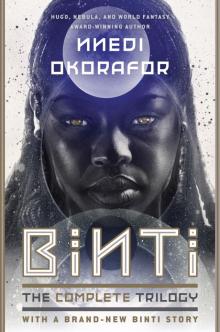 Binti, The Complete Trilogy: Binti ; Home ; The Night Masquerade
Binti, The Complete Trilogy: Binti ; Home ; The Night Masquerade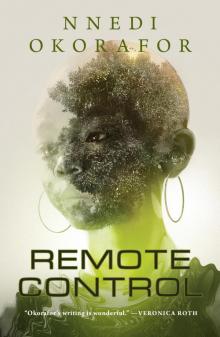 Remote Control
Remote Control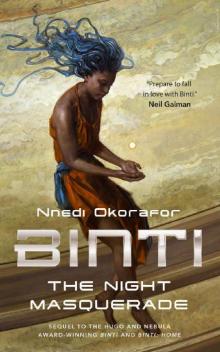 Binti: The Night Masquerade
Binti: The Night Masquerade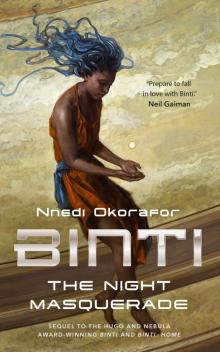 Binti--The Night Masquerade
Binti--The Night Masquerade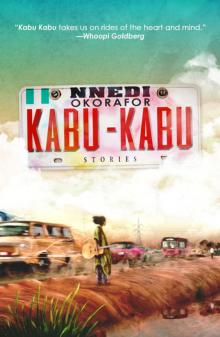 Kabu Kabu
Kabu Kabu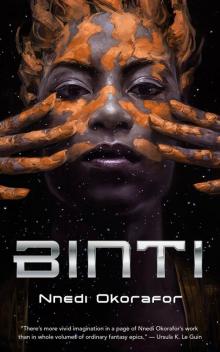 Binti
Binti Zahrah the Windseeker
Zahrah the Windseeker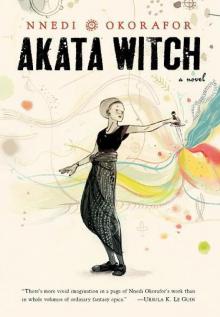 Akata Witch: A Novel
Akata Witch: A Novel Ikenga
Ikenga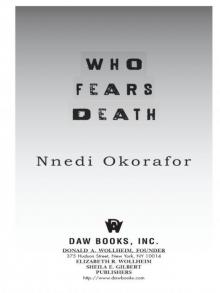 Who Fears Death
Who Fears Death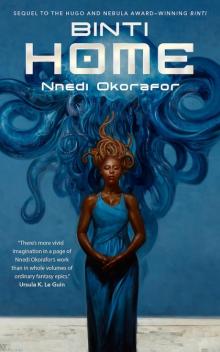 Binti--Home
Binti--Home Lagoon
Lagoon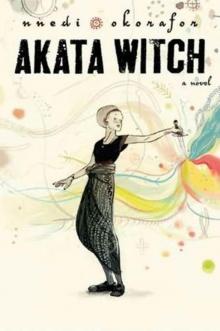 Akata Witch
Akata Witch The Book of Phoenix
The Book of Phoenix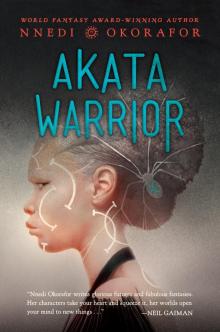 Akata Warrior
Akata Warrior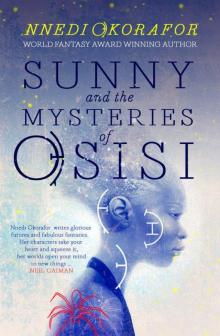 Sunny and the Mysteries of Osisi
Sunny and the Mysteries of Osisi